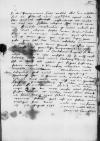Letter #672
Ioannes CAMPENSIS (Jan van CAMPEN) to Ioannes DANTISCUSLeuven (Lovanium), 1531-08-19
| received Brussels, [1531]-08-19 Manuscript sources:
Prints:
| ||||||||||
Text & apparatus & commentaryPlain textText & commentaryText & apparatus
Viro modis omnibus clarissimo, Domino
Salutem.
De
Tuus modis omnibus


 AAWO, AB, D. 6, f. 20v
AAWO, AB, D. 6, f. 20v